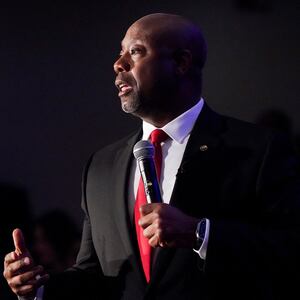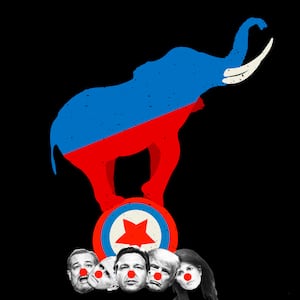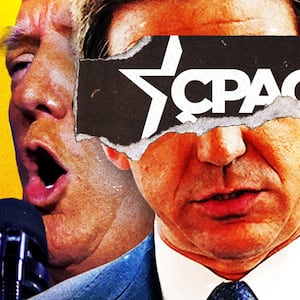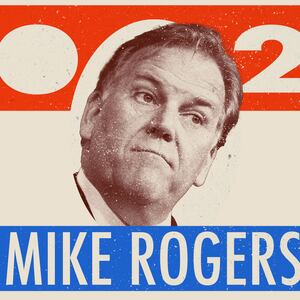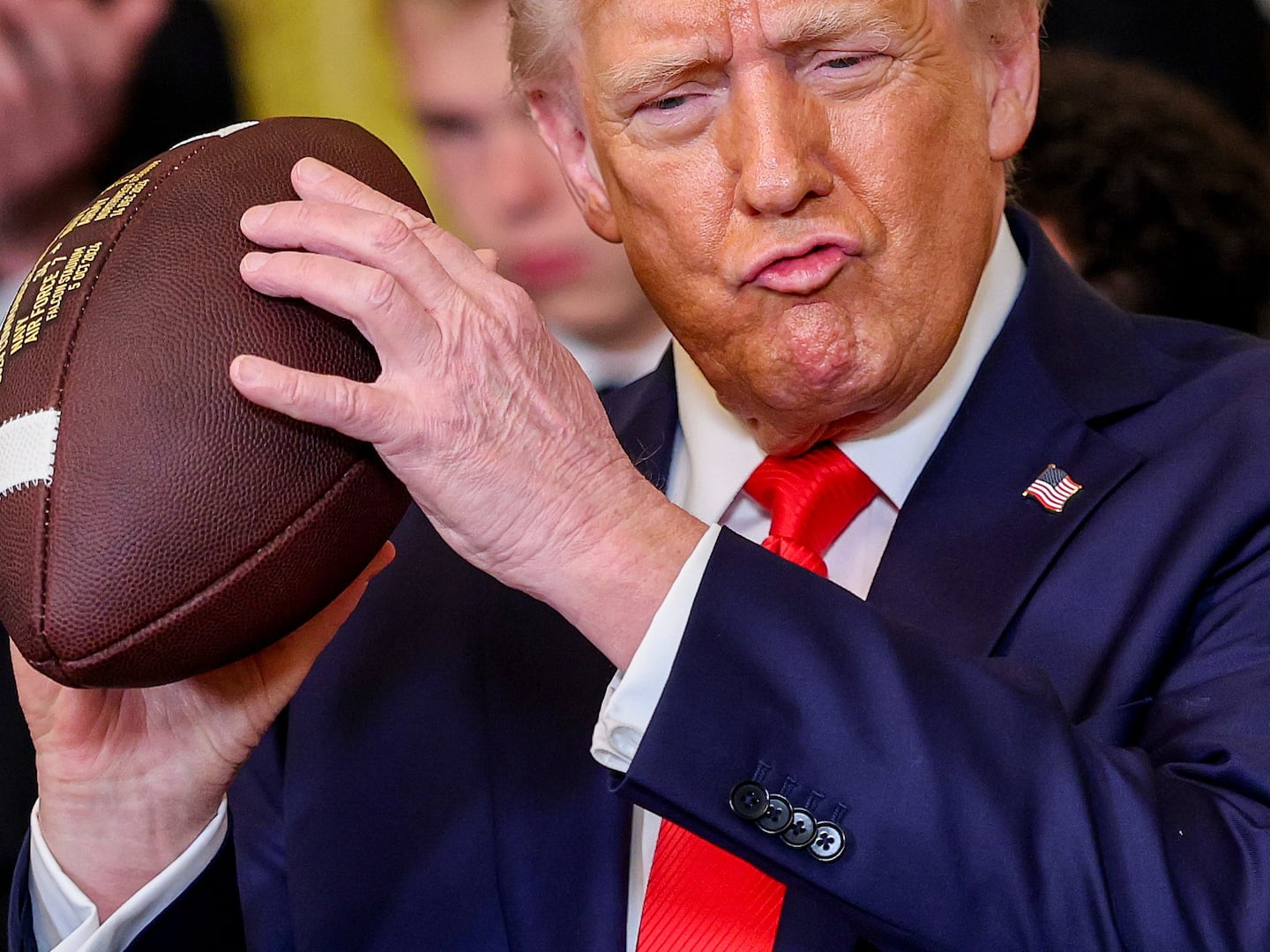Welcome to Trail Mix, a fun but nutritious snack for your election news diet. See something interesting on the trail? Email me at jake.lahut@thedailybeast.com.
This week, we take a look at the bumpy rollout for Sen. Tim Scott’s presidential exploratory committee. After that, we pin down the elusive unofficial deadline for GOP hopefuls to enter the 2024 race.
‘He is a candidate today’
Like an overcrowded public pool, U.S. campaign finance law has some basic guardrails in place to separate real presidential candidates from those simply dipping their toes in the water.
In the proverbial kiddie pool—available to those who launch what’s called an exploratory committee—there are plenty of benefits. They can raise money, which can be used for travel, events, and even commissioning polls.
Perhaps the most basic rule for exploratory committees, however, is that they cannot refer to the person exploring a run as an actual candidate. Once they do that, the hopeful is essentially tossed in the deep end—and the race is on.
After launching his own exploratory committee on Wednesday morning, Sen. Tim Scott (R-SC) ran afoul of that fundamental rule.
One of the early fundraising blasts sent out by the Scott exploratory committee told potential donors: “Tim Scott is running for President of the United States!”
Another call for monthly recurring donations reads: “Now that it’s official, we need grassroots conservatives like YOU to step up and join Tim’s team for the long haul.”
According to Paul S. Ryan, a campaign finance expert who’s filed successful complaints concerning the exploratory phase, that’s a serious no-no.
“Referring to yourself as a candidate is a fact with legal consequences under federal campaign finance law,” Ryan told The Daily Beast.
Federal Election Commission regulations on exploratory committees explicitly prohibit other activities. The potential candidates can’t publicize their intention to campaign, or inform the press when they will announce their candidacy.
In his own remarks, Scott himself has skirted the line: at an event in Iowa on Wednesday, Scott referred to his “candidacy” in the present tense—not future or conditional—in an interview with the AP.
If the South Carolina senator files paperwork for an official presidential campaign committee within the next 15 days, the phrasing is mostly just semantics—as long as the donations qualify retroactively under federal individual limits. (Individuals are allowed to give a campaign up to $3,300 for a primary election and the same amount for a general election.)
Once Scott’s team sent out those fundraising blasts, he effectively left the kiddie pool, Ryan explained.
“Scott’s acknowledgement that he’s exploring a presidential run, combined with his own teams referring to him as a candidate for president, means that for purposes of federal law, he is a candidate today,” Ryan said. He added Scott needs to set up an official campaign within 15 days.
The Scott exploratory committee did not return a request for comment.
Other aspects of Scott’s waters-testing phase haven’t gone swimmingly, either. In his first round of media interviews this week, he struggled to articulate a clear position on abortion access, often declining to answer questions about whether he supports GOP proposals, like a 15-week abortion ban. In 2021, he co-sponsored a bill granting personhood rights to fetuses from the moment of conception.
June or cut bait? The unofficial deadline looming over the GOP field
In the 2020 presidential primary, Democratic hopefuls launched their campaigns earlier than ever before, with some kicking off as soon as January 2019.
Even though the 2024 GOP primary shares a fundamental dynamic—the party is picking a challenger to an incumbent president—it’s increasingly looking like the field won’t be set until summer.
As of today, only four Republicans have officially announced their bids: Donald Trump, former South Carolina Gov. Nikki Haley, entrepreneur Vivek Ramaswamy, and former Arkansas Gov. Asa Hutchinson.
Save for Trump’s entirely premature campaign launch, GOP campaign operatives largely agree that other prospective candidates have been waiting to see when, or whether, Florida Gov. Ron DeSantis might officially kick off his bid.
The conventional wisdom holds that others might stand down if DeSantis, the best-known and best-funded Trump rival, decides to run. Most expect him to enter the race not long after the Florida legislative session concludes on May 5, though some supporters are anxious for him to accelerate that timeline, according to the Miami Herald.
For Republicans looking to qualify for that first debate in Milwaukee on August 12, a senior New Hampshire Republican in touch with prospective candidates gave a firmer unofficial deadline.
“June is the latest, and it’s gotta be someone with everything in place, because you’ll need a certain number of voters and to be included in the polls and everything,” the Granite State Republican said, adding that campaigns should shoot for at least 1 percent in the polls to have a chance at qualifying.
Some campaigns seem to regard June as something of a deadline. An adviser to former Vice President Mike Pence told The Daily Beast his decision should come in the “early summer.”
Dante Scala, a presidential primary expert and University of New Hampshire professor, attributed the slow-moving field to more than just the Trump-DeSantis theory. Though that’s a big reason why “this field is slower to gel,” Scala said, another factor is “concern among lesser-known candidates that there won’t be enough resources, there won’t be enough money left over.”
Money hasn’t been an issue for Haley’s campaign, which pulled in an impressive $11 million fundraising haul in their first six weeks of running. The Haley campaign thinks the early jump they got in February—including not just fundraising but trips to the early states and the southern border—has been paying dividends.
“Nikki is decisive and doesn’t wait around to see what other candidates are doing,” Haley communications director Nachama Soloveichik told The Daily Beast. “Good luck to the other folks trying to catch up.”
While Haley is in the race, other former Trump administration officials such as Pence and former Secretary of State Mike Pompeo have yet to take the plunge, along with other candidates eyeing a more moderate lane, such as New Hampshire Gov. Chris Sununu or former Rep. Mike Rogers (R-MI).
Part of the concern is not playing into Trump’s hands with a crowded field—which could split the vote among non-Trump candidates while MAGA diehards stick with the former president. As one longtime Trump adviser put it to The Daily Beast after the 2022 midterms, “Anything over five is a crowded field. If it’s a crowded field, all Trump has to do is hold onto his base.”
Still, the first debate is the top concern for any candidate not named Trump or DeSantis looking to break through.
“Those debates carry a lot more weight as markers on the calendar, and especially for those lesser-known candidates who need the free media in order to make an impact,” Scala said.
“Because we’ve got a late summer debate to start, yeah, I do think we’re gonna see people deciding to fish or cut bait over the next couple of months in preparation for that first debate in August.”
Image of the week

With Scott inching closer to entering the race, Haley’s campaign has resorted to some clever tactics to undercut her fellow South Carolinian. Fire up a Google search for his exploratory committee—and the first thing to pop up is a Haley-sponsored link to her own campaign website.
Polling Station

FiveThirtyEight launched its 2024 presidential polling model this week and it’s shown a remarkable level of stasis so far.
Only four candidates—Trump, DeSantis, Pence, and Haley—have consistently registered at all.
The page is worth a bookmark as we get closer to the debates and, by some point next January, actual voting.
Campaign Lit
Welcome to the jungle
Our Ursula Perano reports on how “Montana Republicans are trying to take a page out of California’s playbook” by switching to a controversial top two “jungle primary” system. It’s all to mess with Democratic Sen. Jon Tester, who’s up for re-election in 2024 and won his last three races by just 40,000 votes, collectively.
Ron Petty and the Heartbreakers
The DeSantis team started out determined not to back down in the face of the Trump indictment—until they did, the Washington Post’s Hannah Knowles, Josh Dawsey and Isaac Arnsdorf report, with the Florida governor’s response reflecting “the trial and error in his approach as well as his reluctance to declare open warfare against the top-polling Republican candidate.”
High demand
Deputy Politics Editor Sam Brodey reports on how national Democrats’ swift, outraged reaction to the expulsion of the Tennessee Three reflects the party’s increased energy and attention to state legislature races—and could fuel their 2024 plans to fight for more statehouses.
Pritzker secures the bag, steals Atlanta’s thunder
The most enticing part of Chicago’s winning bid to host the DNC? Illinois Gov. J.B. Pritzker’s suggestion that “he and his allies could help finance the event themselves,” Greg Bluestein of the Atlanta Journal-Constitution reports. (Pritzker, a scion of the family that owns the Hyatt hotel chain, happens to be a billionaire.)


